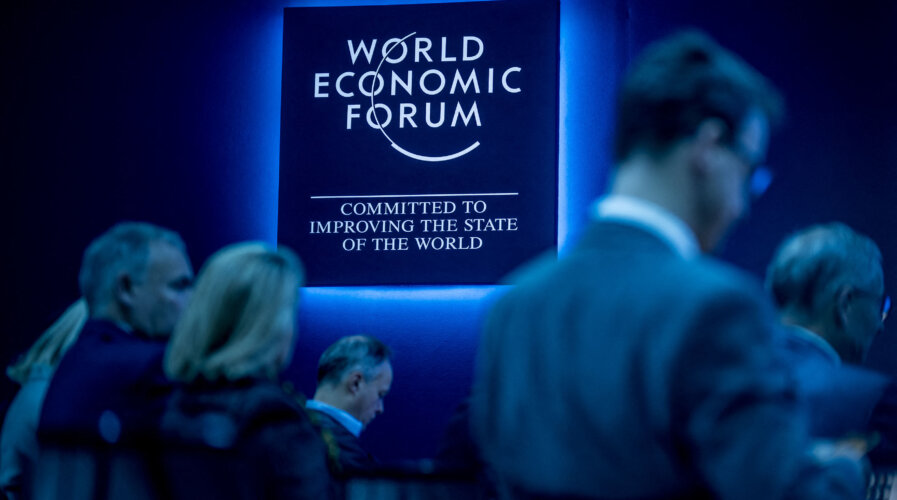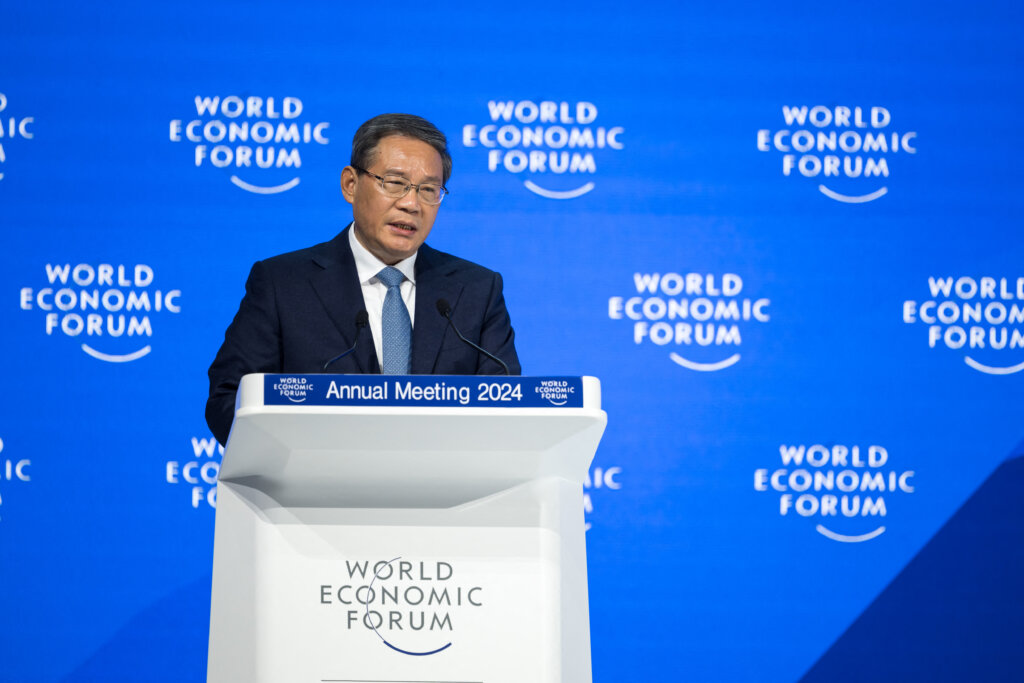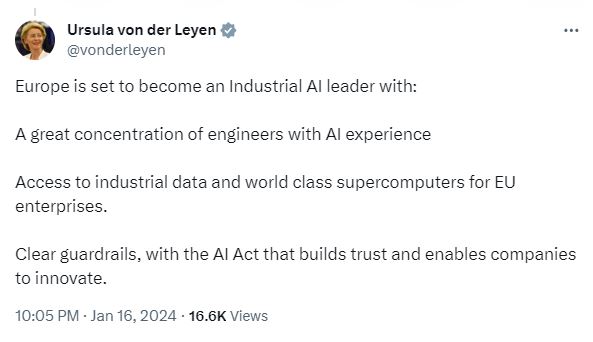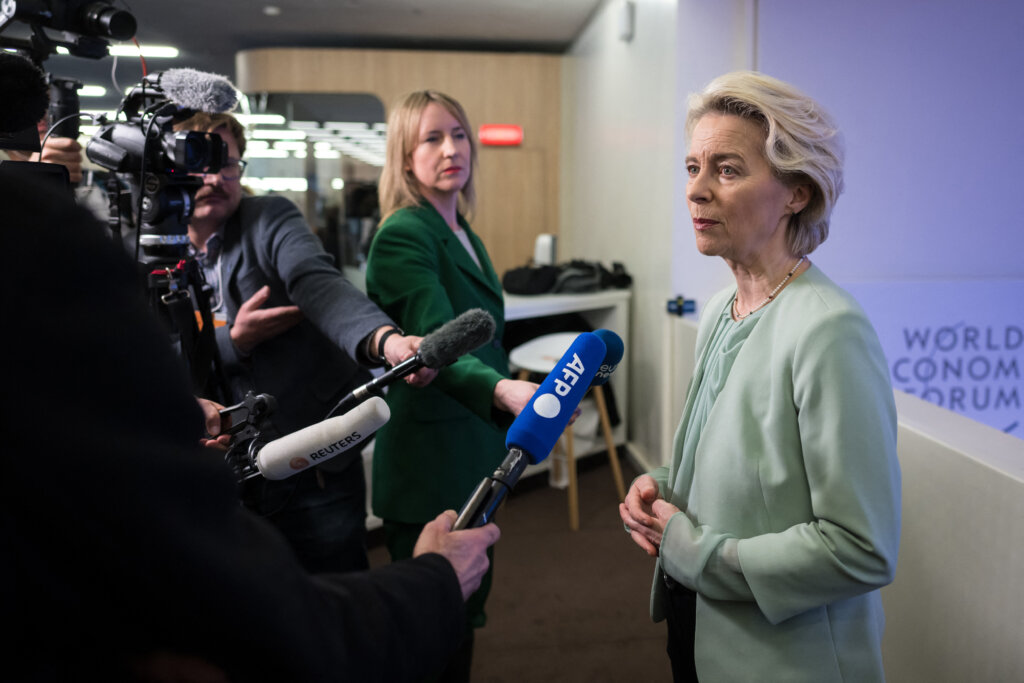
Participants wait for a session at the World Economic Forum (WEF) annual meeting in Davos, on January 16, 2024. (Photo by Fabrice COFFRINI/AFP).
AI dominates conversations at the World Economic Forum 2024
- Global leaders called for more AI guardrails at the World Economic Forum 2024 in Davos.
- Chinese Premier Li Qiang suggested that there should be a red line that is not crossed in the development of AI.
- Ursula von der Leyen, EU chief, told WEF that “Europe must up its game” on AI.
The World Economic Forum (WEF) 2024 in Davos brought together world and business leaders to find ways to improve the state of the world. Over the years, renowned politicians, business leaders, celebrities and tech experts have come together to share their views on how they can help society globally improve their livelihoods.
Apart from geopolitical issues, WEF discussions have also often involved changes that impact society. This includes discussions on the future of work as well as sustainability efforts that countries and businesses can adopt. This year, AI seems to be dominating the conversations at WEF.
“AI as a driving force for the economy and society” is a key theme at this year’s WEF Annual meeting. The forum witnessed discussions on generative AI as well as the impact the technology would have on employees.
With the IMF’s recent Future of Work report stating that almost 40% of employment globally is exposed to AI, there is no denying that there is a need to discuss the impact of AI at the forum. The report stated that among workers, those who are college-educated and women are more exposed to AI, but also more likely to reap the benefits, while strong productivity gains could boost growth and wages.
All this innovation in AI has also witnessed an increasing demand for regulations from all parties. Governments want to ensure the technology is not used for the wrong reasons while businesses want to ensure the technology will not compromise their organizations. But the main focus on calls for regulations would be to protect society from the misuse of the technology itself.

Chinese Premier Li Qiang adresses the assembly during the annual meeting of the World Economic Forum (WEF) in Davos on January 16, 2024. (Photo by Fabrice COFFRINI / AFP)
World Economic Forum 2024: China calls for a red line in AI development
During a session at the World Economic Forum 2024 in Davos, Chinese premier Li Qiang suggested that there should be a red line that is not crossed in the development of AI to ensure the technology benefits society. Citing good governance on the tech’s development, Li urged the world to work together without “camp-based division on confrontation.”
“AI must be guided in a direction that is conducive to the progress of humanity. So there should be a red line in AI development, a red line that must not be crossed,” said Li in his speech.
Li also stated that technology must be inclusive and should not “benefit only a small group of people but benefit the overwhelming majority of mankind.” Li added that is essential for governments to work together and coordinate with each other.
AI development in China is still lagging behind the US, which has been dominating the industry. While both China and the US remain competitive in almost every industry, both countries do agree that regulations and collaborations in AI development are a necessity. However, it remains to be seen how both countries will be working towards it, especially with the US continuing to sanction tech materials to China for developing new products and technology.
China has been critical in the development and deployment of AI. While the country wants to speed up the development and adoption of the technology, it is still taking a cautious approach. Companies developing and using AI in China still have many regulatory requirements to meet when it comes to adopting AI.

“Europe must up its game” on AI.
EU to up its game in AI
Apart from China, the European Union (EU) also wants to take a more serious approach towards AI. Despite plans to curb AI misuse, Ursula von der Leyen, EU Chief told WEF that “Europe must up its game” on AI.
“Our future competition depends on AI adoption in our daily businesses, and Europe must up its game and show the way to responsible use of AI. AI is artificial intelligence that enhances human capabilities, improves productivity and serves society,” she said during her session at the World Economic Forum 2024
This is where the EU’s Artificial Intelligence Act comes in. The Artificial Intelligence Act builds trust by looking at high-risk cases like real-time biometric identification. And by building that trust, von der Leyen said it enables companies to innovate in all other fields to make the most of this new and revolutionary technology.

European Commission President Ursula von der Leyen answers to journalists at the World Economic Forum (WEF) annual meeting in Davos, on January 16, 2024. (Photo by Fabrice COFFRINI/AFP).
Just like the GDPR, which became the benchmark for data protection laws around the world, von der Leyen hopes the AI Act will also serve as a similar template for other countries in regulating the technology.
Europe has nearly 200,000 software engineers with AI experience. This is a greater concentration than in the United States and China. As such, von der Leyen is hoping the EU will be able to catch up with the US and China when it comes to developing new AI use cases and such.
“We can train AI on data of unrivaled quality, and we want to invest in this, and this is why we will provide European start-ups and SMEs with access to our world-class supercomputers. So that they can train and develop and test their large AI models,” added von der Leyen.
It wasn’t just world leaders calling for more regulations on AI at WEF in Davos, Satya Nadella, CEO of Microsoft also stated in his session at Davos that there is a need for global coordination on AI. Nadella also agreed that there should be a set of standards and appropriate guardrails for the technology.
Nadella stated that the world is at a point where global challenges will require global norms and global standards. He added that failure to have such standards could make the technology hard to contain and even tough to enforce.
READ MORE
- Data Strategies That Dictate Legacy Overhaul Methods for Established Banks
- Securing Data: A Guide to Navigating Australian Privacy Regulations
- Ethical Threads: Transforming Fashion with Trust and Transparency
- Top 5 Drivers Shaping IT Budgets This Financial Year
- Beyond Connectivity: How Wireless Site Surveys Enhance Tomorrow’s Business Network


